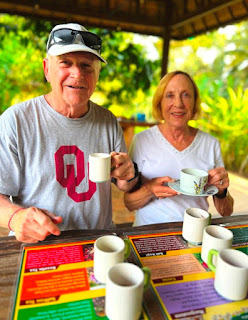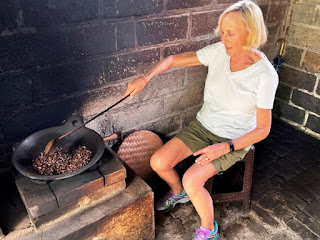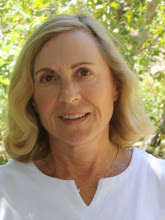If your day doesn’t start until after you’ve downed a steamy cup of coffee, you might be interested in a tasting we recently had the privilege of doing in Bali, Indonesia. I actually drank a cup of Luwak coffee, often called the world’s finest and most exclusive coffee.
It’s also called “bucket list coffee,” a reference
to the 2007 movie Bucket List in
which procuring a cup of this special brew is one of the items that drives
stars Morgan Freeman and Jack Nicholson to accomplish before they die.Larry surrounded by flavorful plants
On a day tour of the island one stop was at Tegal
Sari, an amazing coffee and tea plantation. After walking down paths surrounded
by coffee beans, vanilla leaves, ginger root, cocoa, lemongrass, hibiscus, and cinnamon
(ingredients used in making all-natural coffee and tea flavors) we were treated
to a tasting of a dozen tea flavors and, optionally, Luwak coffee.
Why
is it so special?
A cup of kopi luwak coffee (kopi refers to the
process) generally costs $35 to $80. The high price reflects the traditional,
hands-on process for producing the coffee--no machines are used.The civit at the plantation
The coffee is made from beans retrieved from the
droppings of a small local mammal called the Asian palm civit, which is found
in Southeast Asia. Production takes a lot of time and energy.
This is a three-month supply of poop.
Ripe coffee berries are ingested by a civit, either
in the wild or in captivity. The poop is then collected, every day at Tegal
Sari since they have their own civit. When dry, the uncrushed beans are harvested
from the droppings, washed and sterilized. Then they are roasted and ground for
20 minutes with a mortar and pestle. It’s a slow process.Beans taken from civit poop
The flavor is said to be smoother and less bitter
than regular coffee. The reason is believed to be because the luwak only eats
the ripest coffee fruit, and the fermentation process, along with acidic
enzymes and gastric juices in its stomach, alter the composition of amino acids
and impact the aroma of the coffee. This gives the beans a richer flavor. Some
people say it has hints of caramel and chocolate. Unfortunately, I’m not enough
of a coffee connoisseur to detect those subtle tastes.
Is
it worth trying?
Sure. It’s a unique coffee, and you might decide the
flavor is worth the cost. Anyway, it’s a good cup of joe and a fun experiment. Like
regular coffee, it has antioxidants that help protect the body against
inflammation and chronic diseases. It also has antibacterial properties and is relatively
low in caffeine.Stirring coffee beans over heat is a tough job.
 |
| Beverly drinks luwak coffee, and Larry samples different tea flavors. |
At the very least we had an interesting excursion,
and we now have our favorite teas to remind us of the experience.
Photos by Larry and Beverly Burmeier














No comments:
Post a Comment